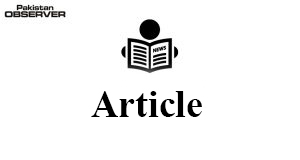JONATHAN ADDLETON
T HE number of Pakistani-Americans — those of Pakistani heritage born in the United States or moving there as children — is approaching half a million. Their ranks include doctors, CEOs, academics, university presidents, authors, actors, politicians and winners of medals for bravery on the battlefield. In contrast, the number of American-Pakistanis probably does not exceed a few hundred. And yet we who carry a “Born in Pakistan” stamp on our passports are marked forever by the land of our birth. Christopher Van Hollen, Jr, Democratic Senator from Maryland, is perhaps the best known of all American-Pakistanis. He was born at the Seventh Day Adventist Hospital in Karachi in January 1959 at a time when his father, later US Ambassador to Sri Lanka and the Maldives, was a junior foreign service officer assigned to Pakistan. As it happens, I was born eighteen months earlier in Murree, the son of missionary parents. Pakistan has been an essential part of my life ever since: Not only was I born in Pakistan, I was also raised in Ratodero, Shikarpur and Hyderabad; attended boarding school in Murree; studied Urdu in Lahore; undertook PhD research in Islamabad; vacationed in Swat and Kaghan; became engaged in Hunza; and, years later, took my own children on an epic journey up the Karakoram Highway to Pakistan’s high altitude border with China. Other “landmark” personal events include a four-year assignment in Islamabad in 1985 at the start of my USAID career and, two decades later, a fourteen-month assignment as USAID Mission Director, also in Islamabad. Recalling my involvement with the USAID earthquake reconstruction effort, I was struck by the number of American-Pakistanis who returned at around the same time to lend a hand. Many shared a similar background, having been born and raised in Pakistan as the children of diplomats, missionaries, aid workers, academics or business people who wanted to help during a time of tragedy. Some were medical workers, others were on the frontlines of the aid effort. The global spread of Coronavirus provides another occasion for both AmericanPakistanis and Pakistani-Americans to reflect on our deeply personal links to both Pakistan and the United States. It is also an ever-present reminder that the world has become a much smaller place since 1956 when my parents first sailed from New York to Karachi aboard a freighter named Steel King. My father became fluent in Sindhi, co-authoring a Sindhi language text for English speakers. He also helped launch Shikarpur Christian Hospital, an institution known for its work with women and children that recently celebrated its 50th anniversary. Having grown up along the Indus River and attended boarding school in the foothills of the Himalayas, I too am part of that heritage, following events in Pakistan with an interest that is more than theoretical. As a child, I cheered Pakistan’s field hockey teams, especially the one that trained in a field across from my old school in Murree and went on to win a gold medal at the high altitude 1968 Mexico City Olympic games. Years later I briefly met Imran Khan at an airport, thanking him for leading Pakistan to victory in the 1992 Cricket World Cup while sheepishly asking him for his autograph. This interest extends to the Pakistan-American community and its contribution to the United States. When a Pakistani-American headed the Bernie Sanders election campaign, I took pride in his impact on American politics. When a PakistaniAmerican businessman acquired a majority share in the Jacksonville Jaguars, I saw this as an unlikely immigrant story that may yet yield Super Bowl success. Some global crises tear people and countries apart. Others bring them together, as happened with the Pakistani earthquake in October 2005 that evoked a strong and unified international response. The ultimate impact of Coronavirus is still unfolding, hitting the United States hard and eventually having a big impact on almost every country in the world including Pakistan. It too requires a unified global response, one that surely also benefits from input from individuals who are globally engaged while also being personally rooted in a particular geographic place, one that in my case includes the country where I was born, raised and spent the first eighteen years of my life. —The writer is a former US Ambassador to Mongolia. He also headed the USAID earthquake reconstruction effort in Pakistan as USAID Mission Director in Islamabad during 2006-2007. His books on Pakistan include Some Far and Distant Place (University of Georgia Press) and Undermining the Centre: The Gulf Migration and Pakistan (Oxford University Press)










